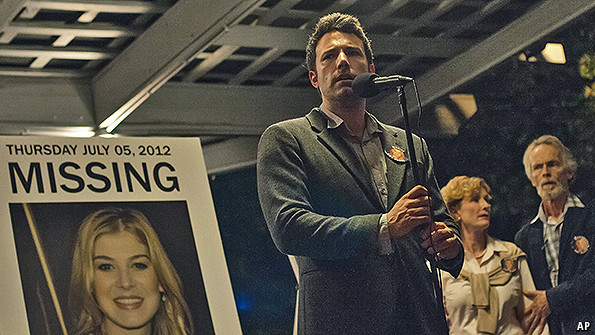
'GONE GIRL', David Fincher's brilliantly glacial adaptation of the bestselling novel about a toxic marriage by Gillian Flynn, opens as the book did: thick with dread. The back of a woman's head and a man's voice, his tone somewhere between caring and creepy. 'When I think of my wife, I picture cracking her lovely skull, unspooling her brains. Trying to get answers: What are you thinking? What are you feeling? What have we done to each other?' Then, abruptly the head moves round and the screen is filled with the chilly smile of Rosamund Pike as Amy Dunne, the 'wronged' wife, her face every bit as inscrutable as that voice. Something is off-but it's not yet clear what.
Rumours that the film adaptation of 'Gone Girl' could have a new ending billowed following an interview with Ms Flynn, who wrote the screenplay herself and who claimed that the film would have 'a whole new third act'. Nervous enthusiasm ensued, suggesting that much of the 'pre-sold audience'-those six million readers-wanted not just to 'see' the book but to re-experience the thrill of not knowing, that carefully balanced sense of unease.
You won't find any spoilers here. But whether or not this version has a new ending, there is no question about one thing: the book's foreboding is recaptured here in full. Everything teeters precariously on the dubiousness of different perspectives. We have two unreliable narrators: Nick Dunne (Ben Affleck), a former New York writer turned Midwest bar-owner, who moved back to his family base in Missouri a few years back with his reluctant, snooty wife, Amy. They have lost more than just their jobs in the recession; they have lost their respect for each other too. Whose fault is that? It depends on whether you're hearing the tale from Amy or from Nick.On the morning of their fifth wedding anniversary Nick comes home after an elevenses bourbon at the bar he owns with his twin sister Margo (Carrie Dickens) to find Amy missing and a glass table knocked violently to the ground. He calls the police and the search begins. But Nick isn't as upset as he could be (the 'killer' smile Mr Affleck produces for Nick's first encounter with the media is a particular delight) and suddenly the public's belief in his guilt settles on him like a rash. Mr Fincher skips artfully between Nick's story and Amy's, using passages narrated from her diary. The two perspectives just don't match up. Is Nick a brute? A thoughtless philanderer with violent tendencies? Or is Amy an unforgiving arch-manipulator?
What the film naturally loses in ambiguity as a result of having to show its protagonists rather than just describe them, it gains from the two remarkable central performances. Ms Pike, as the insecure Manhattan trust fund princess constantly outdone by the children's book character-Amazing Amy-she inspired her parents to write, is a frosty, neurotic nightmare. As Nick, with his square-jawed, alpha-male insouciance, Ben Affleck is just the antithesis she's been looking for. For both actors, a blank look that has in the past made critics question their acting ability now serves them well. We too want to see inside their pretty heads, but we can't.
The audience see the marital cracks before the couple do; both are trying too hard to be what they think the other wants. The flashbacks are altogether too sugar-coated, so perfect that they don't quite seem real. 'We're so cute I want to punch us in the face,' says Amy, coolly fusing sentimentality and aggression. Viewers will too.
Where many readers preferred the first half of the book to the trashier, brassier second half, the film actually improves as it goes along. It thrives on the melodrama so perfectly encapsulated by the distasteful TV shows that condemn Nick as a wife-killer before he has even been arrested. It is dark but very funny too. We laugh partly because we are complicit. The film plays up an expectation of sexism. Nick plays the humbled adulterer; Neil Patrick Harris puts in an excellent performance as a hapless stalker, eliciting both ridicule and sympathy. Tyler Perry, better known as a successful director, is a breath of fresh air as the sharkish attorney who rushes to Nick's rescue, even though he too believes Nick to be guilty.Some people said that this was a film that only Mr Fincher, the director of 'Seven' and 'The Girl with The Dragon Tattoo', could have done well. They were right. Mr Fincher has managed to pace this perfectly, showcasing snippets of scenes before ruthlessly cutting away and moving on to the next.
'Gone Girl' isn't Mr Fincher's best film. It suffers from too many of the same flaws as the novel: a tendency towards absurdity that undermines its granular observations about the reality of domestic life. And yet this could be Mr Fincher's most exemplary film. He is known for his cold, clever precision, and 'Gone Girl' is ever so cold, ever so precise. It is drowning in muted colours and a sense of inevitability. Like Ms Flynn's novel, its cleverness lies in the fact that it is so raw and yet so empty at the same time. This may not be the perfect film-but it is a perfect adaptation. 'Gone Girl' is out now
Post By http://www.economist.com/blogs/prospero/2014/10/new-film-gone-girl
0 comments Blogger 0 Facebook
Post a Comment